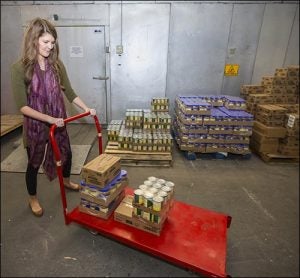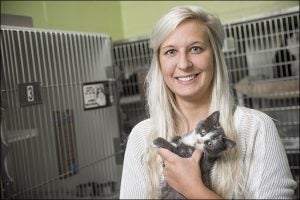PUBLIC SERVICE FELLOWS
ECU program links scholarships to community service
She arrived as an unpaid intern at the Food Bank of Central and Eastern North Carolina, and now East Carolina University junior nursing student Aleigha Criego is having a hard time leaving.
“I will continue working into December but I probably will come back to volunteer here because I have fallen in love with these people,” she said.
Criego is working part-time this semester at Food Bank’s warehouse and distribution center in west Greenville. She’s updating a database of five Pitt County churches, civic groups and other nonprofits that focus on feeding hungry children. She’s also helping to administer the Weekend Power Pack program, where kids are sent home from school on Fridays with backpacks filled with enough food to last the weekend.
The Food Bank benefits from the 300 hours of office work that Criego is donating, and she benefits, too. Criego will earn a $4,500 scholarship from ECU under an initiative aimed at boosting the manpower available to local organizations that deliver critical community services.
She is among 13 ECU students who are interning this semester at small nonprofits and local government agencies through ECU’s Public Service Fellows program.
Like many nonprofits, these agencies could use an extra pair of hands to get their work done. A college intern would help, but often there’s no budget for that. The Public Service Fellows program attempts to solve both those problems.
The initiative is a pilot program operating at ECU and two other UNC campuses under a $300,000 grant from the State Employees’ Credit Union Foundation. The $100,000 that ECU received in April funded 20 fellowships. Seven interned over the summer.
Heading up the initiative is Dr. Sharon Paynter, interim director of public service and community relations at ECU.
Paynter said that after Criego and the other Public Service fellows complete their internships, she and others will determine if the initiative achieved its goals. If the evaluation is positive and the foundation chooses to renew the grant, Public Service fellows could become another effective tool that ECU uses to serve the region, Paynter said.
Brittany Linkous, a senior from Tarboro, also is interning this semester at Food Bank as a Public Service Fellow.

Public Service Fellow Brittany Linkous volunteers at the Food Bank as part of the Public Service Fellows initiative.
Crystal Andrews, the outreach coordinator at Food Bank’s Greenville location, said having Criego and Linkous around the office has been a big help. “They have done a great job updating all our records on the children’s nonprofits that we supply. They are part of our family now.”
Criego said it’s been difficult to fit the internship into a semester already filled with difficult biology courses and clinical training. But she’s glad she did.
“I went with a coordinator to inspect a site at a local church in Greenville, and they were telling their story about how they had progressed (in the number of hungry children fed), about building up their food pantry. And to see the delight in their faces about how they have worked to help their community, that will stay with me for some time.”
Providing Service
Other ECU students serving as Public Service Fellows this semester:
- Katie Antoszyk, a senior athletic training major from Concord; Myranda Fields,a junior athletic training major from Jacksonville; and Thomas Morris, a junior health and human performance from Garner; are providing first aid and emergency care to athletes at three Pitt County high schools – DH Conley, Farmville Central and Ayden-Grifton.
- Allison Jackson, a business major from Rockingham developed marketing materials, planned events and obtained event sponsorships for the Pitt County Animal Shelter.
- Natalie Hicks, a rehabilitation services graduate from Greensboro, is providing in-hospital and outpatient treatment facilities in physical therapy at Granville Medical Center in Oxford.
- Roderick Hall, a senior philosophy and political science major from Riegelwood; Janae Brown, a junior graphic design major from Knightdale; Destiny Johnson, a senior art major from Charlotte; Zack Cleghorn, a junior industrial engineering and technology major from Greenville; and Gilbert Combs, a senior regional and urban planning major from Elizabeth City; are working with the Art + Community Project is to build community and reduce crime through art making and installing art in a university neighborhood in Greenville. Read more about the Art + Community project.
Criego, who hopes to attend medical school, said working at the Food Bank has taught her one important medical principle and a lot about life.
“I have become more aware of the food deficit that is such a problem in our community that I didn’t know was there. I learned how the Food Bank works because I didn’t know where the food came from and who ate it. I learned that this will hold a special place in my heart because this place embodies the good things about people and our community.”
‘It has opened my eyes’
Public Service fellow Sarah Cook is working 24 hours a week at the J.H. Sampson Community Development Center in Kinston—including two Saturdays a month—and will pile up 300 volunteer hours by the end of the semester.
She is helping plan and organize a weekend academic enrichment program for boys and girls in grades 6 through 9. Kids from this neighborhood often struggle with science and math, so Cook is tutoring them on practical and effective ways to raise their scores on end of grade tests.
A junior from Smithfield majoring in middle grades education, Cook said the internship has been a hands-on learning experience. She designed classes for the Saturday academies that offer test-taking tips and advocacy stills. There also are classes in aerobics and yoga, which “help them calm down with their breathing” when they take tests, Cook said.
“As of now I am having all of the participants take a sample EOG test so I can see where they are in their grade level,” Cook said. “After they take the pretests, I create lessons to help them with concepts they missed.”
She also is working with the community center director Margo Dawson to create a tutoring program at nearby Rochelle Middle School, where science and math test scores are low.
“Sarah has strengthened our capacity to organize our database, promote our programs and provide math tutoring,” said Dawson, who ticks off a list of Cook’s other contributions: overseeing the math lab at the Saturday academies, co-writing the community center newsletter and creating forms for the after-school tutoring program.
Cook said she has gotten back as much as she has given.
“It has opened my eyes about this community and how wonderful it is. I had never taught children who need extra help. I used to think of myself teaching in some upper crust area, but now I can really see myself teaching in underdeveloped areas.”
Making volunteering affordable
Isaac Hopkins had considered volunteering as a physical therapist at a rural hospital or doctor’s office. But as a parent with two young children, he confronted a financial roadblock.
“Affording college is tough already, and as much as I wanted to volunteer somewhere, there’s no way I could say to my family, ‘there’s not going to be a check coming in for a few months,’” said Hopkins, who is a senior rehabilitation services major from Morehead City.
“So, this Public Service fellowship means I can get hands-on experience and put food on the table.”
Hopkins, like most of the fellows, is doing work that complements his major. He is interning as a physical therapy technician at Carteret General Hospital in Morehead City.
“You know when you’re in the hospital and you’ve had surgery or a hip replacement, for example, and the doctor wants you to get out of bed and start walking? Well, that’s great if you have enough people like me around to give you that therapy. A lot of small hospitals don’t have staff like that,” Hopkins said.
The internship, which required 450 hours of his time, worked so well that the hospital offered Hopkins a job, which he accepted.
“It turned out great,” he said. “I learned how these hospital procedures work, how to deliver therapy as directed. They got to know me. So, I will walk at fall graduation and already have a job lined up.”
Paynter said many of the interns believe the program enhances their academics.
“We had a meeting (of all the interns) the other night to process some of this and they were talking about getting to do things that make their classroom work come alive. To have an opportunity to practice some things they read about in textbooks has been valuable to them.”
Jama Dagenhart, executive director of the SECU Foundation, said a decision probably won’t be made about renewing the grants until April. She said so far she has received positive feedback.
“I have heard very good things about the program. We like it because it’s one of the only programs I know of that focuses on helping small government agencies and nonprofits.”
